JUST OVER A year ago now, Eoin Griffin’s retirement from rugby was confirmed without too much in the way of fanfare.
At the age of 28 and having played for his native Connacht just over 100 times – as well as spending two seasons with London Irish and representing Ireland at U19, U20 and Emerging levels – the centre decided he was finished with rugby.
Connacht’s press release said Griffin’s progress “has been hampered by injury this season” and while that’s certainly true, he could have played on. There was contact from a French club and he could very well have looked elsewhere, but he was done.
Since then, Galway man Griffin has been away travelling with his girlfriend, Ellen, for six months in Vietnam, Australia, New Zealand, Chile, Argentina and the US before returning home to Galway for a proper Christmas.
He recently secured a new job with Accenture in Dublin which will start once the lockdown is over. In short, life is good and Griffin has no regrets about his decision to move on from professional rugby.
Speaking on the phone from sunny Galway, Griffin explains that his final season with Connacht was a frustrating one. He played just six times due to unfortunately-timed injuries and the strong form of others in midfield, so with his contract running down, he began to consider life beyond the game that had been his job for over a decade.
He spoke to former team-mates who had moved on with their lives post-rugby. Some players struggle, of course, but Griffin heard plenty of happy tales too.
“Often, there’s quite a lot of uncertainty for rugby players,” explains Griffin of his decision to retire. “Your contract is finishing up and you don’t know what’s next or where you’re going to go.
“Speaking to those guys, a lot of them were very happy in what they were doing and some of them were quite recent retirees.
“Sometimes, some players maybe keep going as long as they possibly can just because they don’t know what the next step is. Chatting to guys who had retired gave me a little bit of confidence that there is plenty more to life once you finish rugby.
“Rugby has been a huge part of my life and there are obviously things you would have liked to have done, but I felt I had given it everything I had and probably been a little bit unlucky, especially in my last season with injuries at bad times, inopportune moments. I had been frustrated and maybe it was seeping across into my mood in general. But that’s life.
“I just thought, ‘I’m happy enough to walk away now.’ I didn’t want to go chasing it in France or England or wherever else, being away from family.
“Ellen is a doctor here and she wouldn’t have been able to come over with me. It just didn’t sound overly appealing to me and I was happy to retire.”
Griffin has plenty to be proud of. He showed talent as a youngster with Corinthians RFC and The Jes in secondary school, getting identified by prolific talent-spotter Nigel Carolan and making his way through the Connacht ranks while also playing underage rugby for Ireland – helping the Ireland U20s to the 2010 Six Nations title.
A try-scoring senior debut for Connacht as a 19-year-old in 2010 boded well and Griffin became a key man over the following four seasons – memorably helping them win away to Toulouse in 2013 – while also playing for Emerging Ireland in three Tbilisi Cup campaigns.
He didn’t manage to muscle his way into contention for senior Ireland caps, however, and, at the age of 24, made the move to Premiership side London Irish in 2014.
“It was a bit of a change,” says Griffin. “If I think back now, I hadn’t really been around for years but it felt like I had been in Connacht for a long time.
“I was probably a bit frustrated that I hadn’t kicked on a bit more within the Irish set-up. I wasn’t really involved in many squads or anything, just the Emerging squad, but I wasn’t sure where I stood.
“It was a really tough decision and I was over and back with it. Eventually, I just thought in terms of the life experience and getting out of my comfort zone that it would stand to me most. I did learn a lot about myself and how things are done in different places.”
Griffin’s second season of the two-year contract with London Irish was hindered by injuries and he returned to his native Connacht in 2016, playing out what proved to be the final three seasons of his career.
“I wasn’t always the quickest or strongest but I always worked as hard as I could and I’m very competitive,” says Griffin. “Playing for Connacht was an honour and I really enjoyed it.
“There were tough times in there and some disappointments but I’ve made really, really great friends who I’ve been leaning on since I finished or who I met while we were travelling.”
Indeed, it’s those friends that Griffin values most from his time in rugby. While travelling, he and Ellen stayed with ex-Connacht wing Liam Bibo in Perth before meeting up with Dan Parks and Dave McSharry in Sydney.
Purely by chance, they bumped into his ex-London Irish team-mate, Myles Dorrian, on a ferry to Manly, while they stated with another former Exile, Chris Noakes, after their campervan trip around New Zealand.
While he stresses that rugby players are the last people looking for sympathy, Griffin does say that a pro career is not all glamour.
“It’s definitely up and down. Early in my career, it was great and I was playing every week, hitting the expectations I had put on myself.
“It was frustrating that Connacht and then London Irish weren’t making as much progress as we felt we should be, but you enjoy putting in that hard work and sometimes seeing those results.
“But then injuries… being part of the rehab group, the tedious exercises to try and get back on the pitch – it’s great craic at times too, but it can wear on you sometimes when you’re doing a Q&A rather than being out on the pitch.
“If you’re in the changing room afterwards, you still feel part of it but it’s not the same as being battered and bruised after the win and feeling you really earned that beer.
“Only once it stops do you realise you really weren’t enjoying all those early-morning rehab sessions. You have to be diligent but it can really wear on you, especially after 10 years.”
While Griffin reflects that he could have benefited some other work experience outside the game while he was a pro rugby player, he did have one eye on what was coming next.
Having completed a commerce degree in his early years with Connacht, he took on a part-time master’s degree in Leadership Development in NUIG during his closing three seasons as a pro.
Griffin’s thesis in the final year of that degree involved Connacht, as he examined “how the theories of leadership actually look in real-life in a professional rugby environment.”
Griffin was part of Connacht’s six-man leadership group during his final season, allowing him ideal access and involvement in the process. Some of Connacht’s workings went along with the textbook theories, but others went against what the literate suggested.
“One of the big things we were keen on was keeping all of the players engaged at all times for every session,” says Griffin by way of insight into things Connacht focused on.
“The quality of your training depends on the quality of opposition in training. If you’re pissing through and scoring tries for fun because the other lads have no motivation, there’s no point.”
There was a concentrated effort to make sure players never felt neglected, understood how important they were, how they needed to be ready for opportunities when they arrived, and generally promoting a mentality that everyone in the squad mattered.
All in all, Griffin feels ready to move into his new role in The Dock, Accenture’s innovation centre in Dublin. He says Rugby Players Ireland have been “brilliant” in helping him and others transition out of the pro game.
His rugby career is behind him now but Griffin carries forward many fond memories and good friends.
“Playing for Connacht was just the biggest privilege. We had great times, great wins, the great fellas you get to know over the years. You do get very tight with them and when I was travelling, I got to catch up with the lads in far-flung places.
“Those are the things that have stuck with me.”
- This article was updated at 8.28pm to correct ‘McKeon’ to ‘Griffin’ in the third last paragraph.






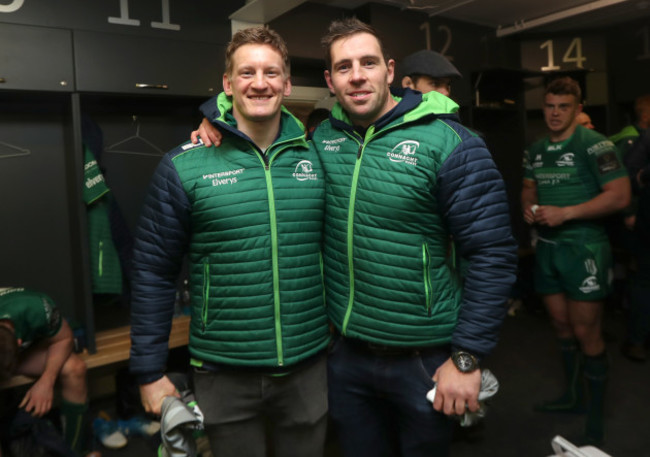
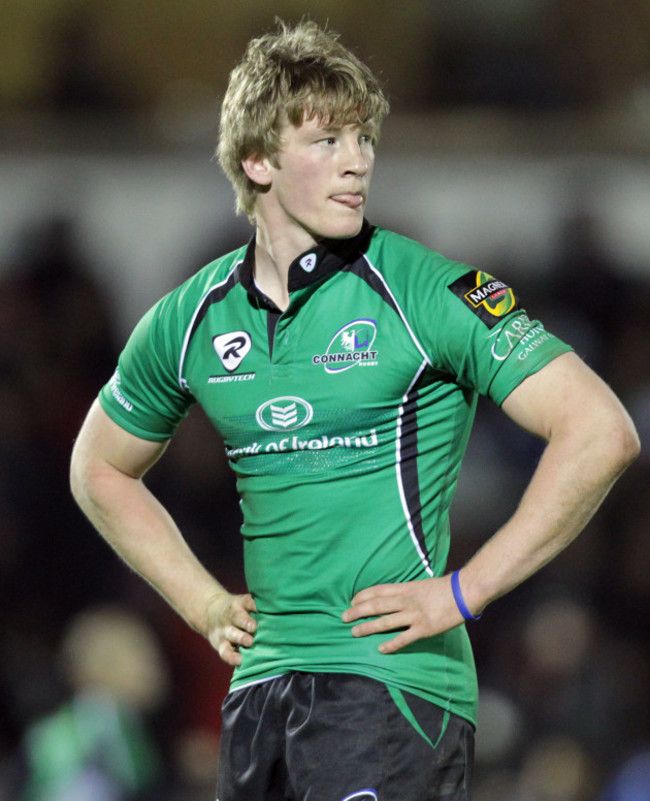
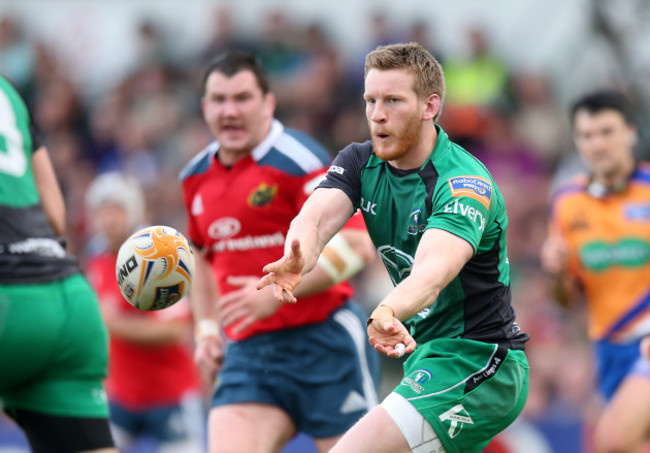
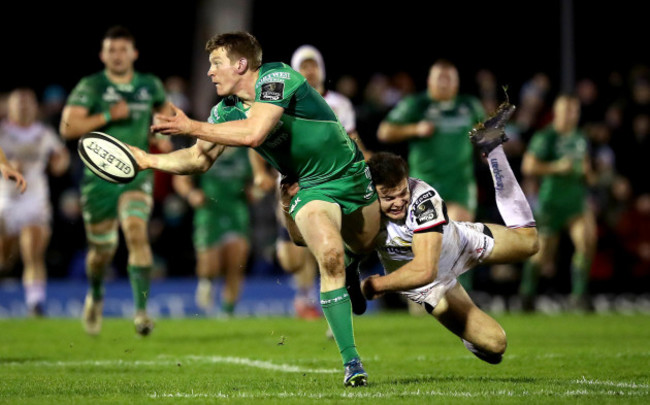


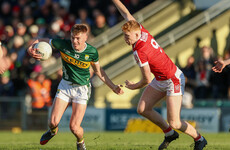
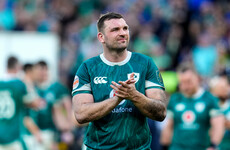
Come on spurs. Destroy those deluded fools.
The irony.
Liverpool fans are the most deluded on this planet. Everyone knows that.
Yidds are in cookoo land
Coming from a United supporter still in denial
How are Spurs delusional? Ask City…
Spurs fans have been deluded since their Champions League dizziness.
Spurs on their day can beat any team in that league; consistency is the problem more so than delusion. The ability is there in droves.
Karol is 100% bang on. Liverpool fans think they are a title winning side that can still compete in the champions league. They’re a mid table club as best. Or as Carragher once said. “Liverpool are no longer a big club”.
Yeah a lot of fans are deluded, sure many united fans thought they were favourites to win the league a few weeks ago. Back where they belong? Hilarious.
Lads, does Ron know United are 3rd and 2 points off top?
Ron, City lodt 4-1 to spurs, a lesser side than Aresnal. Don’t write United off just yet
Ironic, so biased
All football fans are biased when it comes to the team they support, its human nature.
Carol and Loner are correct, they have accepted that Man U are average and have moved on.
Another few hundred million and the league cup is within your sights. The idea of a spurs fan calling Liverpool fans deluded is embarrassing for them
I’m not a Spurs fan.
How on earth are our 3 main strikers all injured?
Liverpool fans must be delighted with a manager actually playing Can and Lucas together in midfield.
Come on the pool !!!
And why is anyone even surprised that Daniel Sturridge is out injured, sick note head on him
He’s hardly making it up, and is fairly useful when he is fit.
Will take a draw
2-2 is 11/1 with PP
Jeasus he’s no-one up front to choose from .. Hope it goes well for him YNWA
For his first game he has a pitiful choice of players.
Come come now. The Liverpool squad is full of promising young players, it’s a bit harsh to be writing them off. I know for a fact if anyone of them played for United you’d have a different perspective. Biased, simple as…..
Come on Kloppo!
3-1 to the Pool!
YNWA
Wouldn’t get ahead of yourself there, I got a back lashing the last time I gave a prediction. It will a good game however.
You’re not calling him Kloppo already are you. Oh God.
Ah Chris is back!!!! I LOL with his prediction in the arsenal game how do you call it today Chris?
Alan B = Pathetic.
Not as pathetic as your predictions Christopher
Difference is Alan B, I can say I got it wrong and acknowledge it.
Where there is you, whom keeps sprouting crap on this site.
I can imagine Alan B having really greasy hair and needs glasses because of all the time he’s spent looking at a computer screen.
You do know the journal is available as an app on smartphones unknown you don’t have to log on to your computer to read it
What’s your prediction today Christopher?
Chris, I would have predicted this would turn into a slagging match.
3 – 1 Spurs with Kane 1st goalscorer
Make that 2-1 and I’d agree with you
What’s your prediction in the united game?
1-1 draw
Mine was 0-3 ! Was I close ….
I’ve had a bet with my Liverpool supporting nephew that whoever loses has to send the other a photo naked in a shopping center. Please win Spurs !!!
@Shakka
Could turn out to be the worst bet of your life.
Come on da Pool!
why do you want to see your nephew naked?
Are you his aunt or uncle. Too weird either way
Please tell me your nephew is over 18 at least.
I’d go into the jacks in one and send one from there. you should have been more specific
Or a changing room
Which shopping centre?
What was the plan in case of a draw?
Well, a patched up team, against a very good team that destroyed Man City…. Sorry to disappoint deluded Man U fans, but Liverpool have a manager who is going to reinvent this club, bring them back to where they belong….. Will take time, but it will happen.
Yeah shoring up the defense has to be the priority but Liverpool did get a few chances in the second half. Spurs were the better team but not by enough to deserve the win.
And having faith in some players….Sakho for example.
Sakho Sh!te